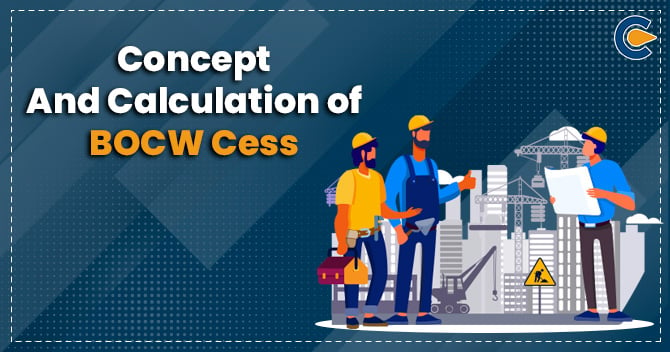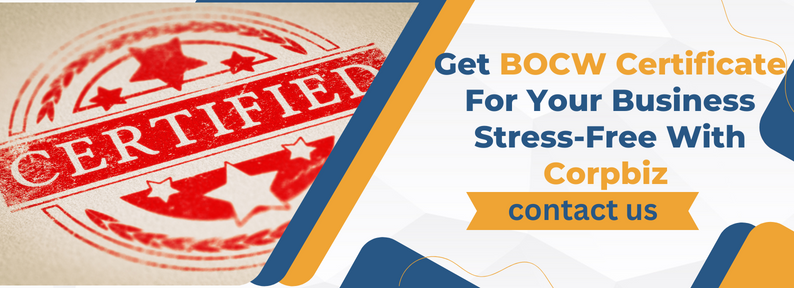The BOCW Cess under the BOCW Act refers to a taxable amount paid by the registered employer against the project’s cost. The Government has enacted various provisions around BOCW Cess under the BOCW Cess Act, 1996[1] and Rules, 1998. This article shall discuss the concept and calculation of BOCW cess in detail.
What Is The Slab Rate For BOCW Cess Under The BOCW Act?
The current rate at which cess is applicable ranges from 1-2%.
What Factors Need To Be Considered For Cess Estimation?
Cost of the project, i.e. cost incurred by the employer for constructing the building.
Note: Employer is not required to take cost of land and any compensation paid to worker into account for the cess calculation.
When Employer Should Pay Out The BOCW Cess?
- The employer should pay cess within 30 days of the finalization of the project or within 30 days of the date on which assessment of cess is completed, whichever is earlier, to the cess collector.
- If the project’s duration surpasses the one-year timeline, the employer should pay the cess within 30 days of one year from the date of commencement of the project and every year after that at applicable rates on the project’s cost incurred until the completion of the project.
- Where the local authority permission is mandatory for the construction work, every application for such permission shall be attached with a demand draft in favour of the Board for the amount at applicable rates.
- The advance cess payment is possible for projects whose duration is likely to surpass a one-year timeline. Common enclosures required to be attached for advance cess payment include;
- Notice of the project’s commencement as per the Section 46
- Demand draft enclosing the cess amount in favour of the respective Board.
- Advance cess paid by the employer under Sub-rules 3, 4, and 5 shall be adjusted by the AO during the final adjustment.
Provisions around the Cess Assessment
Every employer is liable to file Form 1 under the Cess Rules with the AO within 30 days of the commencement of the project of payment of cess. Upon receiving the said Form, the AO shall initiate the vetting process of the same.
Post successful vetting, the AO makes the assessment order enclosing the cess amount payable and shares the same with the followings;
- Employer
- Board
- Cess collector
The assessment order usually encloses the following information
- Amount of cess due
- Cess already deducted at source or paid
- Balance amount payable
- The due date for paying the cess amount
The employer is liable to reply to the assessment order within the prescribed timeframe to avert any chances of re-estimation.
Where an AO has passed an assessment order, and the employer opts to withdraw from or shut down the project or alter the project’s plan, thereby reducing the cost of a project undertaken, he may seek revision of the AO by filing Form II with the Assessing Officer.
Penalties for Late or Non-Filing of BOCW Cess
In such a case, the AO may slap a penalty equivalent to the estimated cess amount. A reasonable opportunity shall be given to the defaulter by the Accessing officer to put their case upfront.
Information to be provided by the employer in the Form- 1
- The registration number issued under the BOCW Act
- Name and address of the establishment
- Number of workers employed
- Date of commencement of the project
- The estimated cost of the project
- Details of payment of cess
Points To Summarize Regarding BOCW Cess
- The estimation of BOCW Cess should be based on the overall construction expenses addressed by the registered employers.
- The factors like worker’s wages and land cost are not considered for cess estimation.
- BOCW Act has assigned the responsibility of cess estimation to the official called Accessing officer. Such officials have the right to access the finances of the registered employer to calculate the exact cess amount.
- Any dispute relating to cess estimation or discharge can be resolved at Appellate Authority constituted under the Act. To engage in the hearing process, the aggrieved employer has to file an appeal and a prescribed fee with the Appellate Authority.
- In case of deferred payment, the interest amounting to two per cent of the overall cess amount shall be imposed on the employer in question.
- In case of intentional cess evasion, the defaulter may be subjected to a penalty of Rs 1000 or a jail term of 6 months or both. The same is also true of the falsification of data for cess discharge.
- The scope of penalties for alleged fraud or cess evasion shall apply to everyone in cases where defaulting party is a company.
- The decision made by the Appellate Authority shall remain unchallenged in any Court of Law.
- Central Government reserves the exclusive authority for amending cess related provisions under the BOCW Act. Every amendment made shall be shared publically by the Central Government via Gazette Notification.
- Under no circumstances such penalties would come to effect unless the defaulter gets a fair hearing before the Appellate authority.
- It is at the discretion of the Central Government to amend the provisions around the BOCW cess.
Conclusion
BOCW Act enforces stringent penalties for evasions or late filing of BOCW cess. The land cost and wages paid to the workers are not taken into account for estimating the cess amount. The net project cost is the only basis of cess estimation.
Read Our Article:Functions of BOCW Welfare Board













